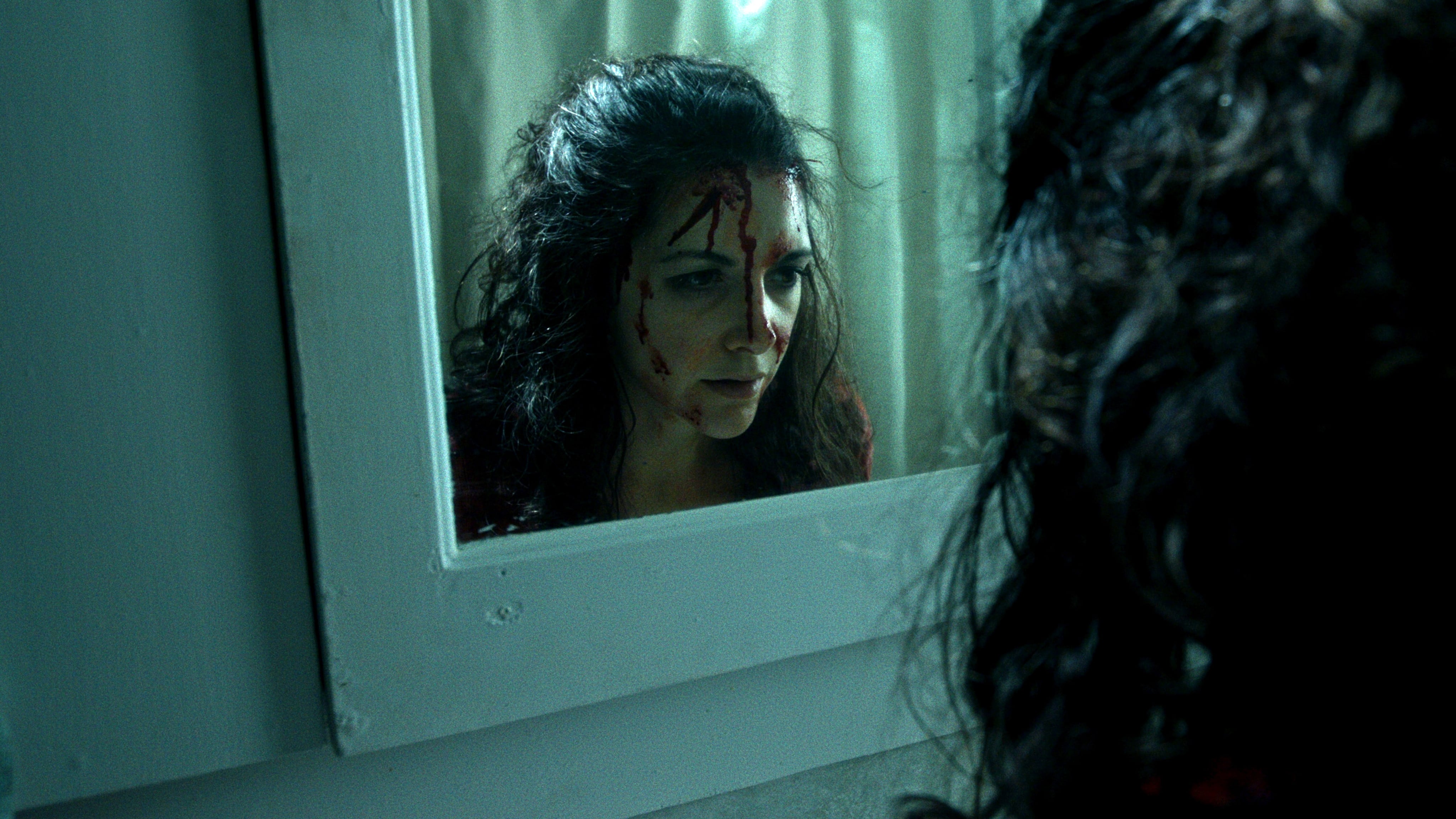Lilly Lives Alone, Portland-born writer, director and cinematographer Martin Melnick’s feature directorial debut, takes viewers inside a fever dream of blurred reality, generational trauma, substance abuse and bereavement. On the 10th anniversary of her daughter’s death, Lilly (Shannon Beeby) finds herself haunted and spiraling within the confines of her home. Are her visions the result of self-medication, hysteria or ghosts? Melnick will participate in a postshow Q&A when Lilly Lives Alone screens at Cinemagic on Aug. 22 (another screening is set for Aug. 24 as well, minus the Q&A).
“I really wanted the house, space and atmosphere that Lilly is living in to feel like a claustrophobic womb so the whole movie itself becomes this pregnancy,” Melnick tells WW.
Dark Sky Films purchased Lilly Lives Alone’s distribution rights after the movie’s premiere at last year’s Brooklyn Horror Film Festival. The locally made horror movie was filmed in Portland, Estacada and St. Helens, and on the Oregon Coast. The picture displays cool tones and enchanting cinematics that lull audiences into Lilly’s otherwise dreamy nightmarish world. Her house is somewhat of a character, protecting Lilly from the outside world’s oppressive threats while encapsulating for her the terrors that its walls have witnessed. Portland’s familiarity adds an uncanny eeriness for local viewers. Melnick’s production and art team transformed a South Hood Avenue bungalow into an unrecognizably desolate and remote haunted house.
Melnick originally wrote Lilly Lives Alone to take place in a trailer home, but his team had trouble securing one. He says many mobile home parks he scouted were owned by out-of-state real estate companies that often make it difficult for film crews to shoot on their properties. He pivoted and rewrote the film for a small house, but in a stroke of luck, Melnick’s team found a home being renovated into a rental property.
“We’ll give it a nice fresh coat of paint and leave it nicer than we found it,” Melnick promised the owner. “He agreed, and it was wonderful because his neighbor had an Airbnb basement with a garage apartment right next door, so we were able to set that up as a green room and have our lunches there. Everything worked out to have this little corner block. He owned the house next to it as well, so that’s where we were able to set up the neighbors’ [scenes].”
Sarah Johnston, Melnick’s wife, co-produced the film with him. When it premiered at BHFF, Melnick and Johnston were expecting. Their outcome was fortunately better than Lilly’s, but the way art imitated Johnston and Melnick’s lives was uncanny.
“When we first started the production, we weren’t actually decided on having a baby yet,” Melnick says. “It’s kind of interesting to watch the movie post-having a baby and how it impacts me emotionally different as a father now.”
Birth, rebirth and the cycle of life, mirroring the journey of self acceptance and reconciliation, are undercurrents throughout the film. Motifs of cells dividing, embryos growing, and a supernaturally twisted pregnancy sculpt an unsettling metaphor that those looking for a cheap jump-scare thriller may lack the patience to digest. But scares there are, in addition to psychological thrills.
Beeby is captivating as Lilly, showing enough depth and range for viewers to stick by her, given some questionable choices she demonstrates onscreen. Her romantic interest, Jed (Ryan Jonze), presents intentionally suspiciously in an over-the-top performance in which he is still outshined by his real-life wife, Beeby. The cast is rounded out by horror and Star Trek legend Jeffrey Combs (the Re-Animator series, House on Haunted Hill, The Frighteners), who is unrecognizable as Lilly’s neighbor, Russel. Jonze and Combs deliver surprisingly campy performances, though perhaps they just seem that way from offsetting Beeby’s intensity. Either way, it felt as though the three characters were from different universes.
One of the most touching takeaways I received from Melnick was the tenderness he expressed toward his character Lilly. Many of the choices she makes are under duress. “You can’t really judge people for circumstances that lead to them making decisions—even if they’re bad decisions, because you don’t know what you would do in that same situation,” Melnick says. “So it’s important for me not to judge Lilly. She’s a complex character. She is trying her best with the tools that she’s been given, and that’s part of that generational cycle of trauma. She wasn’t given very good or apt tools.”
Prescribed gender roles amid the greatest loss of all are pretty heady and heavy topics to tackle, but for anyone welcoming a metaphoric and metaphysical horror watch, Lilly Lives Alone will grind gears and turn wheels. It gives just enough information to set viewers up to feel like they know what’s going on, but leaves just enough out to keep them guessing. The way Melnick shoots Portland is visually beautiful enough to make the watch worth it. He looks forward to Lilly Lives Alone’s hometown debut.
“I’m really excited to share something that so many talented people in Portland worked on,” Melnick says. “It’s been a long road. It’s just one of those things with indie films, especially when you get to distribution stuff, that just takes time. I’m excited to share it and celebrate with everyone who worked so hard on it.”
SEE IT: Lilly Lives Alone at Cinemagic, 2021 SE Hawthorne Blvd., thecinemagictheater.com. 7 pm Friday and 4:40 pm Sunday, Aug. 22 and 24. $7–$9.

